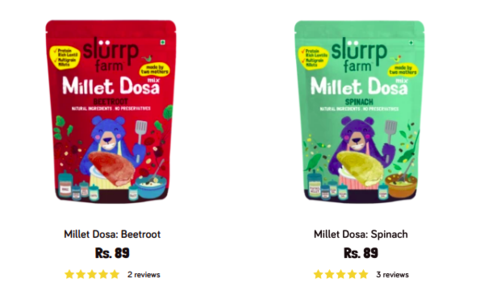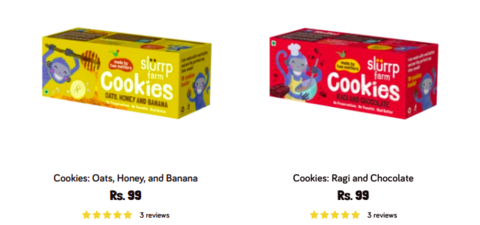by Lea Ramapuram
Picture this. You’re standing in front of your precious little one, seated appropriately in her brand new booster seat, with a bowl of mashed carrots in your hand. Your partner is ready with the camera, waiting to capture this important milestone…The first spoonful of mashed food is gingerly placed into your baby’s mouth along with exclamations of happiness and genuine excitement, while your baby picks up on the festive air and giggles out loud, adding to the sweetness of the moment!
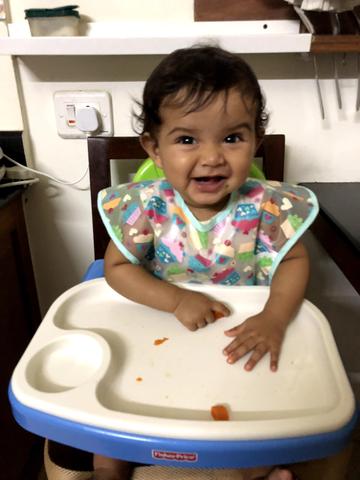
Starting solids – decidedly one of the most exciting milestones for new moms is also a time of experimentation and uncertainty. What would be the best food to start with, how many meals a day does a 6-month-old need, why does your baby’s poop smell so bad? Mammas everywhere find themselves frantically consulting Dr. Google on a vast array of doubts. And I know exactly how trying a time this can be!
I made several mistakes when I started my little girl on solids – I was far too excited and ill-informed. From giving her a whole boiled egg at just 5 months old, which she then threw up for the rest of the day, to not being aware that breast milk would be her main source of nutrition for the first year of her life, so I didn’t have to worry about her “not eating enough” – I do wish I had equipped myself better before starting on this adventure.
Which is why it’s useful to have all your questions answered in one place, don’t you think? – a survivor’s guide of sorts. Read on for the most comprehensive guide to starting solids, and start your baby’s first food journey on all the right notes and flavors.
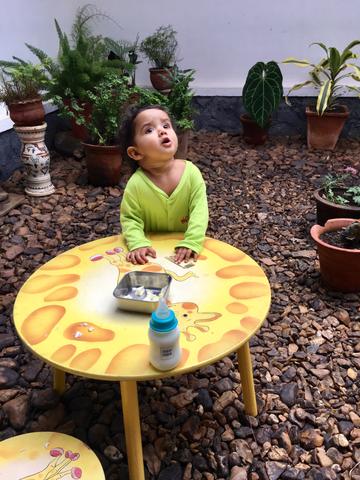
When Should I Start Offering Baby Solid Foods?
According to guidelines set by the WHO, your breast milk is the only nutrition your baby needs for the first six months of her life. The composition of your breast milk changes depending on your baby’s specific needs, and the benefits of nursing her extend well into childhood. So rule number one, don’t rush your baby just because you’re excited, mama!
There are certain signs of readiness which you can keep an eye out for, which will help you decide if your baby is ready for that first exciting spoonful of mush:
- Baby is around 6 months old
- Baby can hold his head up in a steady, upright position
- Baby can sit up without support
- Baby has lost her ‘tongue-thrust reflex’ – babies tend to naturally push out anything that’s put into their mouths with their tongue, including the first spoonfuls of food you will offer her.
- Baby can pick up an object with her forefinger and thumb
- The baby looks at the food you are holding with interest and occasionally tries to grab at whatever he sees you eating
- Baby still looks hungry after a full day’s feeding of breast milk
If you think your baby is showing signs of readiness and is indeed ready to start having mealtimes that don’t involve a boob, the next important step is for you to set a mealtime routine.
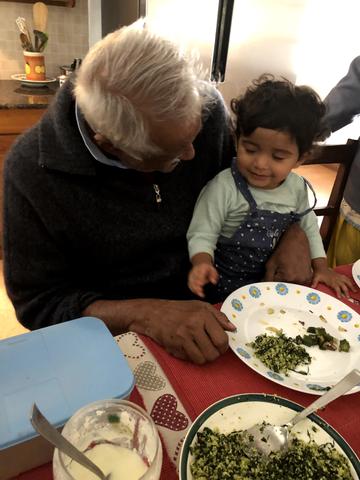
Setting Mealtime Routines:
Your baby needs to be calm and focused on him to be able to have a meal and enjoy it, so make sure that mealtimes are not stressful for you or your baby. Schedule a regular time at which you intend to try to feed him and stick to it. Turn off the TV or any other loud noises in your home. Put your phone away and give him your undivided attention.
Your baby is going to be exposed to a whole host of new sensations – the feel and taste of many different foods, the effort it takes to learn how to keep food in his mouth and swallow it, and eventually, learning to feed himself. So keep in mind that mealtimes at the beginning are more about fun, learning tastes and textures and exploring new sensations for your baby, rather than a time when he has to have his nutritional needs met. That will primarily be your breast milk, up until his first birthday anyway.
How Many Meals Should I Start With?
To begin with, offer your baby no more than one solid meal a day, consisting of one or two tablespoons of purees or mashes. By 7 months, you can push it up to two meals, and by 9 months most babies can typically have three meals a day, each the size of your baby’s fist. A good aim to have is to get baby on a big-girl routine by the time she’s one year old – this includes three full meals with two or three snacks in between.
Tip: My little-one enjoyed her first few bites of millet dosa at 9 months, and she now enjoys wraps, dosa-pizzas, idlis and cutlets made from Spinach and Beetroot Millet Dosa Mix. Isn’t that cool?
How Can I Tell When My Baby is Full?
If your baby begins to lean back into his chair, turns his head away from the food being offered to him, starts spitting out food he was otherwise chomping down enthusiastically or refuses to open his mouth for the next bite – these are signs he’s done with his meal.
Never force your baby to eat more than he wants to – this will prevent him from learning to follow his hunger cues, and may lead to him continuing to eat more than he needs well into childhood. There are no health benefits to stuffing your baby with too much food, I promise.
What Are Some Good First Foods To Try?
Single-ingredient fruit or vegetable mashes or purees without any salt or sugar are a good, traditional first food you could offer your baby. Pumpkin, sweet potato, carrots, and beans are some vegetables you could try. Avocados are an excellent option too and contain lots of good fats that your baby needs.
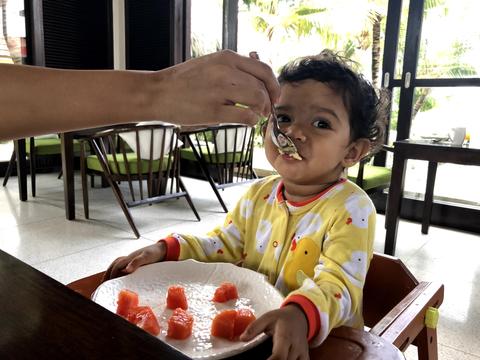
Fruits like bananas can either be mashed or cut into bite-sized pieces. Apples or apricots are a good option too but are better off with gentle cooking and mashing. One of the most sensible pieces of advice I received while starting my baby on solids was to sweeten rice, ragi or wheat porridge with date paste – this makes their food naturally sweet, while also providing iron, one of the most important nutrients that a baby starting on solids requires.
A lot of parents are wary of starting their babes on meats, but there’s no research to prove the benefits of a vegetarian diet, and well-cooked shredded chicken, or flaked fish can be an excellent source of protein and iron. You could also try safe and healthy adventurous first foods, to expand your baby’s palate.
Tip: I was very keen on introducing ragi, so I mixed yummy, no-dalda, buttery ragi cookies in milk and you could try it too!
The only foods you need to avoid until the baby is a year old are honey and cow’s milk. Also avoid foods that are a choking hazard, like nuts, popcorn, whole grapes or peanut butter.
Useful Tips To Keep In Mind:
It’s a good tip to nurse baby before each meal in the beginning. This ensures baby isn’t overly hungry, to begin with, starts in a good mood, and feels comforted and calm before experiencing something new. It also ensures that the baby won’t wean herself too early, which is a drawback of introducing too many solids too early.
Remember that as a time of learning and experiments, mealtimes are going to be messy. Spread newspaper or an old bed sheet kept aside for the cause under your baby’s high chair or booster seat to help with easy cleanups. Expect and enjoy the mess!
Many babies prefer finger foods to mashes or purees – you could try baby-led-weaning, a method of introducing first foods that completely bypasses all spoon-fed food and introduces baby to bite-sized portions that he can feed himself.
Start by introducing single ingredients and wait a week before offering new food. This gives you time to understand if your baby is reacting badly to any food you fed him or begins to show signs of an allergy (a rash, a runny nose or a sore bottom).
Don’t give up when you see your baby refusing a certain food. Wait a week and introduce it again. You might have to try several times before a baby starts enjoying a particular flavor or texture – the key is to try again and again with good time intervals.
In Conclusion, Do Not Stress:
The most important lesson I learned in the first year of my baby’s life is that it’s okay for me to trust my instincts, and to trust her too. Your baby is more self-aware than you realize, especially when it comes to something as natural as hunger.
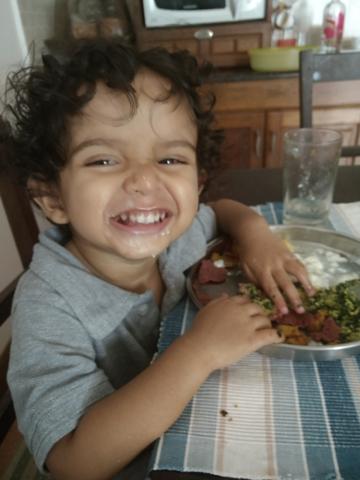
Allow mealtimes to be about fun and learning; allow it to be a time when you bond with your child, rather than a time of frustration and exhaustion and tears. Do not allow yourself to be pressured by other moms, whose children are completely different from your own, and might eat more or more varied foods than yours does.
What’s important is that you show your baby you trust her and that she’s allowed to trust herself – and what better, simpler way to start, than allowing her to decide what and how much she eats.
About Lea Ramapuram: Lea is a writer-mom to two beautifully exhausting kids under two. She finds sanity and purpose in reading and writing amidst the chaos.
